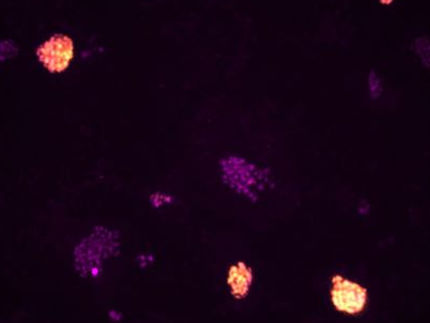A*STAR Scientists Discover Key Component in the Mother's Egg Critical for Survival of Newly Formed Embryo
Advertisement
An international team led by scientists at A*STAR's Institute of Medical Biology (IMB) discovered that a protein called TRIM28, normally present in the mother's egg, is essential right after fertilisation to preserve certain chemical modifications or 'epigenetic marks' on a specific set of genes. This newly published study paves the way for more research to explore the role that epigenetics might play in infertility.
Previous studies have shown that both nuclear reprogramming as well as 'imprinting' are vital for the survival and later development of the embryo. However, the underlying mechanisms governing the intricate interplay of these two processes during the early embryonic phase have not been clear, until now.
Nuclear Reprogramming
Immediately after fertilisation, the majority of the 'epigenetic marks' on the DNA from the sperm and egg cells are erased. The erasure process, termed nuclear reprogramming, allows the genes from the parents to be reset so that the early embryonic cells can develop into any cell types of the body.
Genomic Imprinting
On the other hand, certain 'epigenetic marks' on a particular set of genes, some from the mother and some from the father must be preserved. These genes are said to be 'imprinted' by their parent of origin and preservation of these marks is critical for the survival of the newly formed embryo. Expression of these imprinted genes at the appropriate levels ensures proper development of the embryo. If the 'epigenetic marks' on the 'imprinted' genes are not protected, severe and multiple developmental defects occur in the embryo.
Using genetically identical mice from an inbred mouse strain, Drs. Davor Solter and Barbara Knowles, Senior Principal Investigators at IMB, observed that none of the embryos resulting from the fertilisation of eggs lacking TRIM28 survived. The embryos died at varying stages of development, and had very different developmental defects. Given that most genetic diseases attributed to the lack of a single gene have consistently similar defects in every affected individual, the highly varied abnormalities observed in the maternal TRIM28-deficient, yet genetically identical mice, were peculiar.
To further elucidate these findings and the role of TRIM28 during nuclear reprogramming, Dr. Daniel Messerschmidt, the first author of this paper, collaborated with Dr. Anne Ferguson-Smith, a visiting Professor at A*STAR's Singapore Institute for Clinical Sciences (SICS), from the University of Cambridge, UK. Together, they conducted a comprehensive study on the epigenetic state and the level of expression of a group of imprinted genes known to be important for development. Using highly sophisticated microarray analysis and advanced biochemical techniques, they found that not only is the presence of TRIM28 protein important during this critical period, but the timing and amount of TRIM28 made available to the newly formed embryo greatly impacts the expression of these imprinted genes at later developmental stages.
Genomic imprinting was first described by Dr. Davor Solter at the Wistar Insitute and by Dr. Azim Surani at Cambridge University three decades ago. Recently, Dr. Solter suggested that the interplay between nuclear reprogramming and genetic imprints could be explained by a simple analogy from school where the teacher writes a long string of formulas on the black board. At the end of the class, he marks stretches to be preserved for the next day's lecture (these are the imprinted marks) and asks the cleaning lady to erase the rest (she performs the reprogramming).
Dr. Solter said, "For the longest time, we didn't know why some bits of the formulas escaped erasure. Through this study, the mystery is finally revealed! We now know TRIM28 instructs the 'cleaning lady' which part of the formulas she should preserve."
Dr. Azim Surani, who was not involved in this study, said "This elegant study on TRIM28 provides significant mechanistic insights on how maternal factors in eggs ensure faithful epigenetic inheritance that plays a critical role during development. These findings are relevant not only for the widely practised in vitro fertilisation of eggs for the treatment of human infertility, but also more generally for highlighting the importance of epigenetic mechanisms in development and disease."
Dr. Knowles, the senior author of this paper said, "Lack of TRIM28 in their eggs could explain why some women consistently suffer from multiple failed pregnancies where embryos die at different time points, manifesting multiple, different abnormalities."
Prof. Birgitte Lane, Executive Director of IMB, said, "Understanding the role of differential epigenetic modifications is important for the study of human diseases and development. This study has unravelled a critical component essential for nuclear reprogramming. The mechanistic insights revealed have far-reaching clinical implications for treatment of diseases with patient-specific cell therapies. This finding demonstrates how discoveries of fundamental research can shed light on biological questions to open new avenues of formulating therapeutic strategies for the benefits of patients."
Original publication
Daniel M. Messerschmidt, Wilhelmine de Vries, Mitsuteru Ito, Davor Solter, Anne Ferguson-Smith, Barbara B. Knowles; "TRIM28 Is Required for Epigenetic Stability During Mouse Oocyte to Embryo Transition"; Science.


















































